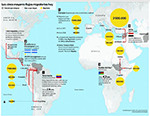Towards a geography of migration
DOI:
https://doi.org/10.15381/espiral.v1i2.17133Keywords:
migration, geography, social sciences, territory, powerAbstract
Population displacements from their place of origin to a different one, characterizes the 20th century and what goes from the 21st century. The ecological, political, economic crises and the increase in violence, give rise to people deciding to leave everything to bet on the unknown and place themselves in another place that guarantees a dignified life with a different lifestyle. Because of these problems, many citizens do not have a healthy life - physical, mental and emotional - (lack of access to medicines - especially vaccines - and food). Natural phenomena, as a consequence of the environmental crisis in the world, have highlighted the huge social gaps that characterize underdeveloped or developing countries. Thus, 21st century immigrants seek to integrate into the society they decided to reach and seek to improve their quality of life (decent work, good pay, healthy eating, access to health and education). In this sense, this work, part of the idea that foreign immigrants recreate certain strategies to achieve social insertion in a particular urban space. For this reason, we consider that, in order to study the direction of the migratory movement, the distance traveled and the magnitude of the migrant population, the use of social sciences such as sociology, history, anthropology, economics, political science and geography corresponds. Every time, the movement of people from one space to another implies profound changes in social life, in this article we study an aspect of geography that is human geography, as it allows us to approach the understanding of Migratory problem and the characterization of the 21st century migrant.
Taking into account that human geography allows us to study society and its relationship with the physical space (study of the human being and its relations with the environment), and considering the approach of geopolitics, give us the possibility to raise the idea that gives rise to the title of the article: towards a geography of migration. We propose to analyze three aspects: the theoretical approach of migration from geography; geopolitics and human geography and, the question of power.

Downloads
Published
Issue
Section
License
Copyright (c) 2019 Ivonne Teresa Valencia León

This work is licensed under a Creative Commons Attribution-NonCommercial-ShareAlike 4.0 International License.
LOS AUTORES RETIENEN SUS DERECHOS:
a. Los autores retienen sus derechos de marca y patente, y también sobre cualquier proceso o procedimiento descrito en el artículo.
b. Los autores retienen el derecho de compartir, copiar, distribuir, ejecutar y comunicar públicamente el artículo publicado en la revista Espiral (por ejemplo, colocarlo en un repositorio institucional o publicarlo en un libro), con un reconocimiento de su publicación inicial en la revista Espiral.
c. Los autores retienen el derecho a hacer una posterior publicación de su trabajo, de utilizar el artículo o cualquier parte de aquel (por ejemplo: una compilación de sus trabajos, notas para conferencias, tesis, o para un libro), siempre que indiquen la fuente de publicación (autores del trabajo, revista, volumen, número y fecha).





